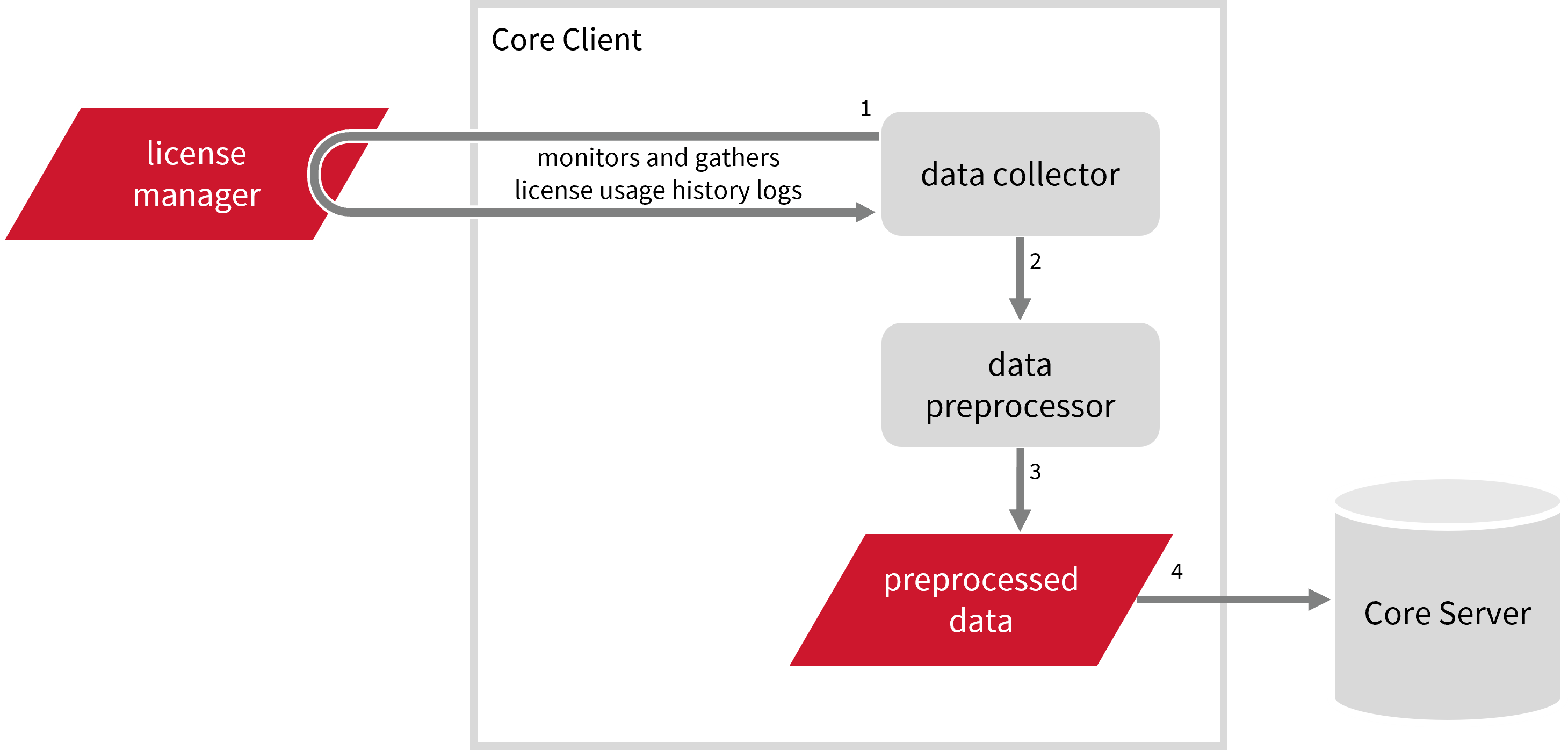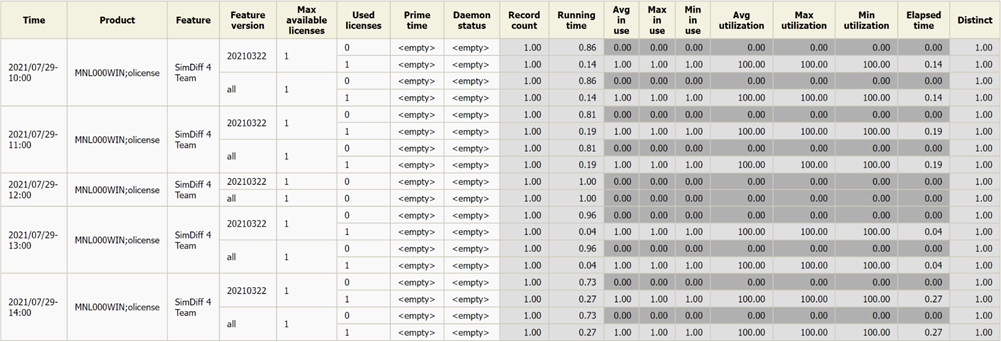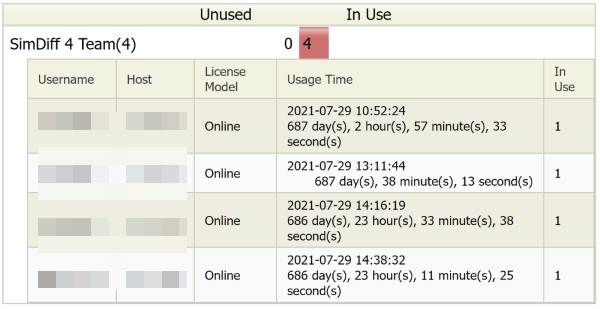OLicense Server
Introduction
Open iT supports OLicense usage reporting by collecting log files and converting them to Open iT format.
An Open iT Core Client is installed on your license server for this collection. The data collector monitors and gathers the license usage history logs from the license manager every 5 minutes. Once the logs are collected, the data collection process triggers and the logs are passed to the data preprocessor. After the data is preprocessed, it is transferred to the Core Server for further storage, completing the history logs collection and processing.

This will produce the following aggregated data types used for historical reporting:
Record Log Data:
- (89) Total License Use Licenseevents
- (90) Individual License Use Licenseevents
- (91) Usergroup License Use Licenseevents
- (108) Host License Use Licenseevents
- (109) Hostgroup License Use Licenseevents
Event Log Data:
The following sections will guide you in setting up the necessary configuration to collect and send the required data to the server.
Apply the configurations in the Open iT Core Client.
Requirements
- An Open iT Core Client connected to an Open iT Core Server or a coexistent Open iT Core setup
- License server administrative rights
- Full path to the debug log file
Specifying OLicense Log File Path
These are the required steps to specify the path to the OLicense log files.
- Windows
- Unix
-
Go to the Components directory, which is by default in
C:\Program Files\OpeniT\Core\Configuration\Components, and back up thelogfilecollector-olicense.xmlfile. -
Open a command prompt with Administrator level privileges.
-
Go to the bin directory, which is by default in
C:\Program Files\OpeniT\Core\bin, run the command:Command Syntaxcd <bin_dir>Examplecd C:\Program Files\OpeniT\Core\bin -
Once in the directory, set the location of the OLicense log files, run the command:
Command Syntaxopenit_confinit -c "logfilecollector-olicense.logfilecollector.source.dir=<olicense_log_dir>"where
<olicense_log_dir>is the location of the OLicense log files.Exampleopenit_confinit -c "logfilecollector-olicense.logfilecollector.source.dir=C:\Users\Administrator\Desktop\olicense" -
Update the configuration file, run the command:
Command Syntaxopenit_confbuilder --clientMake sure no errors are encountered.
Advanced Configuration
Refer to the OLicense Log File Collection Configuration table to learn more about OLicense configuration in logfilecollector-olicense.xml.
| Object Name | Accepted Value | Description |
|---|---|---|
| source.dir | DirName (i.e., C:\Users\Administrator\Desktop\olicense) | Location of the OLicense log files. |
| source.pattern | String (i.e., *.log) | The glob pattern identifying source files in the source directory. |
| source.seen | String (collect, ignore, or tail) | Seen files are the previously collected source files.
|
| source.cmplines | Integer (e.g., 6, 10, 20) | This is required if the value of source.seen is tail. This is the number of lines compared to source files collected before to determine where to start the collection. Note: If this number is too low, you can end up with an incorrect position, and duplicate data may be in the log files. Usually, it is better to have a few lines more than strictly necessary than even a single line too little. |
| target.dir | DirName (i.e., ${OpeniT.directories.temp}/LogFileCollector) | This is the location of the directory containing the collected log data. |
| target.module | String (i.e., license) | The target type of module (in general). |
| target.datatype | String (i.e., olicense) | The specific type of target data. |
| target.interval | Timespan (e.g., P30S, P5M, P1D) | The span of time between collector runs. |
| target.rotation-size | Integer (e.g., 6, 10, 20) | The log file rotates if it goes beyond the number (in mb) defined. |
| target.rotation-glob | String (e.g., *) | The glob pattern to match before the log file rotates. |
-
Go to the Components directory, which is by default in
/var/opt/opentit/etc/Components, and back up thelogfilecollector-olicense.xmlfile. -
Go to the bin directory, which is by default in
/opt/openit/bin, run the command:Command Syntaxcd <bin_dir>Examplecd /opt/openit/bin -
Once in the directory, set the location of the OLicense log files, run the command:
Command Syntax./openit_confinit -r /var/opt/openit/ -d /var/opt/openit/etc/ -c "logfilecollector-olicense.logfilecollector.source.dir=<olicense_log_dir>"where
<olicense_log_dir>is the location of the OLicense log files.Example./openit_confinit -r /var/opt/openit/ -d /var/opt/openit/etc/ -c "logfilecollector-olicense.logfilecollector.source.dir=/var/opt/olicense" -
Update the configuration file, run the command:
Command Syntax./openit_confbuilder --clientMake sure no errors are encountered.
Advanced Configuration
Refer to the OLicense Log File Collection Configuration table to learn more about OLicense configuration in logfilecollector-olicense.xml.
| Object Name | Accepted Value | Description |
|---|---|---|
| source.dir | DirName (i.e., /var/opt/olicense) | Location of the OLicense log files. |
| source.pattern | String (i.e., *.log) | The glob pattern identifying source files in the source directory. |
| source.seen | String (collect, ignore, or tail) | Seen files are the previously collected source files.
|
| source.cmplines | Integer (e.g., 6, 10, 20) | This is required if the value of source.seen is tail. This is the number of lines compared to source files collected before to determine where to start the collection. Note: If this number is too low, you can end up with an incorrect position, and duplicate data may be in the log files. Usually, it is better to have a few lines more than strictly necessary than even a single line too little. |
| target.dir | DirName (i.e., ${OpeniT.directories.temp}/LogFileCollector) | This is the location of the directory containing the collected log data. |
| target.module | String (i.e., license) | The target type of module (in general). |
| target.datatype | String (i.e., olicense) | The specific type of target data. |
| target.interval | Timespan (e.g., P30S, P5M, P1D) | The span of time between collector runs. |
| target.rotation-size | Integer (e.g., 6, 10, 20) | The log file rotates if it goes beyond the number (in mb) defined. |
| target.rotation-glob | String (e.g., *) | The glob pattern to match before the log file rotates. |
OLicense Events Log File Collection Configuration
Activating Event Log Data Collection
These are the required steps to activate collection of the OLicense log file for events.
- Windows
- Unix
-
Open a command prompt with Administrator level privileges.
-
Go to the bin directory, which is by default in
C:\Program Files\OpeniT\Core\bin, run the command:Command Syntaxcd <bin_dir>Examplecd C:\Program Files\OpeniT\Core\bin -
Once in the directory, activate the collection of OLicense events log data, run the command:
Command Syntaxopenit_oconfinit -u "collect_license_olicense-logs.root.scheduler.jobs.collect_olicense_licenselogs.general.active=true"
-
Go to the bin directory, which is by default in
/opt/openit/bin, run the command:Command Syntaxcd <bin_dir>Examplecd /opt/openit/bin -
Once in the directory, activate the collection of OLicense events log data, run the command:
Command Syntax./openit_oconfinit -u "collect_license_olicense-logs.root.scheduler.jobs.collect_olicense_licenselogs.general.active=true"
Advanced Configuration
The collection runs every 5 minutes by default. To configure the intervals, locate the instances attribute under collect_olicense_licenselogs, preprocess_olicense_licenselogs-events, or transfer_olicense_licenselogs in the same file and configure the attributes.
Refer to the OLicense Log Job Scheduler Instances Configuration table to learn the attributes used to configure OLicense data collection and transfer.
| Attribute Name | Accepted Value | Description |
|---|---|---|
| max-instances | Uint (e.g., 5, 8, 9) | The number of instances allowed to run the at the same time. |
| max-handling | String (end-oldest, end-all-old, or end-new) | The action done upon reaching the maximum number of instances:
|
| end-timeout | Timespan (e.g., P30S, P5M, P1H) | The maximum waiting time before terminating a running instance. |
| quarantine | Timespan (e.g., P30S, P5M, P1H) | The waiting time before starting a new instance after a previous one. |
Verifying Event Log Data Collection
After configuration, you can verify that the data is collected and sent to the Core Server by following these steps:
- Windows
- Unix
-
Open a command prompt with Administrator level privileges.
-
Go to the bin directory, which is by default in
C:\Program Files\OpeniT\Core\bin, run the command:Command Syntaxcd <bin_dir>Examplecd C:\Program Files\OpeniT\Core\bin -
Run the command:
Command Syntaxopenit_executor -r collect_license_olicense-logs -
Verify that there are
archiver*.infiles created in the Core Server's archiver directory, which is by default inC:\ProgramData\OpeniT\Data\incoming\archiver.
-
Go to the bin directory, which is by default in
/opt/openit/bin, run the command:Command Syntaxcd <bin_dir>Examplecd /opt/openit/bin -
Run the command:
Command Syntax./openit_executor -r collect_license_olicense-logs -
Verify that there are
archiver*.infiles created in the incoming directory in your defined data_dir($ROOT_DATA_DIR)upon Open iT Core Server installation.
OLicense Records Log File Collection Configuration
Activating Record Log Data Collection
These are the required steps to activate collection of the OLicense log file for records.
- Windows
- Unix
-
Open a command prompt with Administrator level privileges.
-
Go to the bin directory, which is by default in
C:\Program Files\OpeniT\Core\bin, run the command:Command Syntaxcd <bin_dir>Examplecd C:\Program Files\OpeniT\Core\bin -
Once in the directory, activate the collection of OLicense records log data, run the command:
Command Syntaxopenit_oconfinit -u "collect_license_olicense-record-logs.root.scheduler.jobs.collect_olicense_licenselogs-records.general.active=true"
-
Go to the bin directory, which is by default in
/opt/openit/bin, run the command:Command Syntaxcd <bin_dir>Examplecd /opt/openit/bin -
Once in the directory, activate the collection of OLicense events log data, run the command:
Command Syntax./openit_oconfinit -u "collect_license_olicense-record-logs.root.scheduler.jobs.collect_olicense_licenselogs-records.general.active=true"
Advanced Configuration
The collection runs every 5 minutes by default. To configure the intervals, locate the instances attribute under collect_olicense_licenselogs, preprocess_olicense_licenselogs-events, or transfer_olicense_licenselogs in the same file and configure the attributes.
Refer to the OLicense Log Job Scheduler Instances Configuration table to learn the attributes used to configure OLicense data collection and transfer.
| Attribute Name | Accepted Value | Description |
|---|---|---|
| max-instances | Uint (e.g., 5, 8, 9) | The number of instances allowed to run the at the same time. |
| max-handling | String (end-oldest, end-all-old, or end-new) | The action done upon reaching the maximum number of instances:
|
| end-timeout | Timespan (e.g., P30S, P5M, P1H) | The maximum waiting time before terminating a running instance. |
| quarantine | Timespan (e.g., P30S, P5M, P1H) | The waiting time before starting a new instance after a previous one. |
Setting Max Available Licenses
The raw log file does not include information on the maximum available licenses. Set this manually by following these steps:
- Windows
- Unix
-
Open a command prompt with Administrator level privileges.
-
Go to the bin directory, which is by default in
C:\Program Files\OpeniT\Core\bin, run the command:Command Syntaxcd <bin_dir>Examplecd C:\Program Files\OpeniT\Core\bin -
Once in the directory, set the number of your maximum available licenses, run the command:
Command Syntaxopenit_oconfinit -u "matchobjects-record-olicense.matchobjects.post-processing.data-process3=<max_avail_licenses>"where
<max_avail_licenses>is the number of your maximum available licenses.Exampleopenit_oconfinit -u "matchobjects-record-olicense.matchobjects.post-processing.data-process3=100"
-
Go to the bin directory, which is by default in
/opt/openit/bin, run the command:Command Syntaxcd <bin_dir>Examplecd /opt/openit/bin -
Once in the directory, set the number of your maximum available licenses, run the command:
Command Syntax./openit_oconfinit -u "matchobjects-record-olicense.matchobjects.post-processing.data-process3=<max_avail_licenses>"where
<max_avail_licenses>is the number of your maximum available licenses.Example./openit_oconfinit -u "matchobjects-record-olicense.matchobjects.post-processing.data-process3=100"
Verifying Record Log data Collection
After configuration, you can verify that the data is collected and sent to the Core Server by following these steps:
- Windows
- Unix
-
Open a command prompt with Administrator level privileges.
-
Go to the bin directory, which is by default in
C:\Program Files\OpeniT\Core\bin, run the command:Command Syntaxcd <bin_dir>Examplecd C:\Program Files\OpeniT\Core\bin -
Run the command:
Command Syntaxopenit_executor -r collect_license_olicense-record-logs -
Verify that there are
archiver*.infiles created in the Core Server's archiver directory, which is by default inC:\ProgramData\OpeniT\Data\incoming\archiver.
-
Go to the bin directory, which is by default in
/opt/openit/bin, run the command:Command Syntaxcd <bin_dir>Examplecd /opt/openit/bin -
Run the command:
Command Syntax./openit_executor -r collect_license_olicense-record-logs -
Verify that there are
archiver*.infiles created in the incoming directory in your defined data_dir($ROOT_DATA_DIR)upon Open iT Core Server installation.
Sample Reports
Historical Reports





Real-time Reports

Troubleshooting
Max in Use is Greater than Max Available Licenses
Problem
This issue may be encountered when the license checkouts were processed even though there weren't license checkins.
Resolution
A new command line option --autooff is added so you can configure the duration before checked out licenses are automatically checked in.
These are the required steps to configure:
- Windows
- Unix
-
Open
collect_license_olicense-record-logs.oconfin the scheduler directory, which is by default inC:\Program Files\OpeniT\Core\Configuration\scheduler. -
Locate the
--autooffargument inroot.scheduler.jobs.preprocess_olicense_licenselogsrecords.operations.argumentsand set its value to the desired duration before automatically checking in checked out licenses.collect_license_olicense-record-logs.oconfarguments
{
type=string
value=--srcdir "${OpeniT.directories.temp}/Raw.Olicense.Record" --srcpattern raw-olicense-license-LogFileCollector*.data --srcfilehandling delete --trgdir "${OpeniT.directories.temp}/LogParserOlicense" --module license --datatype record --resolution PT1H --matchobjects "${OpeniT.directories.conf}/matchobjects-record-olicense.oconf" --type record --autooff PT5M
} -
Save the changes.
-
Open
collect_license_olicense-record-logs.oconfin the scheduler directory, which is by default in/var/opt/openit/etc/scheduler. -
Locate the
--autooffargument inroot.scheduler.jobs.preprocess_olicense_licenselogsrecords.operations.argumentsand set its value to the desired duration before automatically checking in checked out licenses.collect_license_olicense-record-logs.oconfarguments
{
type=string
value=--srcdir "${OpeniT.directories.temp}/Raw.Olicense.Record" --srcpattern raw-olicense-license-LogFileCollector*.data --srcfilehandling delete --trgdir "${OpeniT.directories.temp}/LogParserOlicense" --module license --datatype record --resolution PT1H --matchobjects "${OpeniT.directories.conf}/matchobjects-record-olicense.oconf" --type record --autooff PT5M
} -
Save the changes.